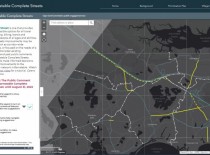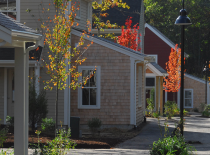Category: Newsletter
The 2024 Regional Transportation Plan will be a 25-year vision for the future of transportation on Cape Cod, looking ahead to the year 2050. It is a community-driven, performance-based plan that considers the unique challenges and opportunities of the region. The Plan is expected to include strategies to meet Climate Action Plan goals to reduce vehicle miles traveled, support low and no-carbon transportation options, and accelerate the electrification of the transportation system.
Many of the Cape Cod Commission's projects and initiatives include robust stakeholder engagement: public meetings, presentations, design charettes, and public comments. But the pandemic rendered in-person meetings infeasible. So how do you connect with stakeholders when you can't meet in person?
Door County, Wisconsin, is a peninsula comprised of more than a dozen distinct communities. Surrounded by Lake Michigan and Green Bay, the area is a popular tourist destination. With its geography, natural beauty, arts and culture, and miles of beautiful coastline, it's no wonder Door County has been called the Cape Cod of the Midwest.
Cape Cod Commission Deputy Director Erin Perry recently presented information about the Cape Cod Commission to the Door County Environmental Council as they work to combat similar economic and environmental issues.
From 2018 to 2020, there were 14,404 vehicle crashes reported on Cape Cod, 33 of which were fatal.
This Regulatory Update provides a status on projects currently under review by the Cape Cod Commission. Visit www.capecodcommission.org/regulatory for an overview of our Regulatory program and answers to frequently asked questions.
To support, advance, and contribute to the Commonwealth’s goal of net zero carbon emissions by 2050, Commission staff is working across different levels of government and with local advocacy organizations to promote the adoption of EVs and the expansion of EV charging infrastructure.
In late August, Energy and Environmental Affairs Secretary Beth Card declared that the Cape Cod region is experiencing a critical Level-3 drought. Conserving water now will help to reduce water use to ensure that water is available for drinking and fire protection, habitats have enough water to support their natural functions, and to sustain the long-term availability of water supplies.
The Regional Housing Strategy aims to address housing supply, affordability, and availability issues by identifying appropriate areas for housing development and creating policies and strategies to further the plan’s goals.
The Cape Cod Commission has begun work on the Cape Cod Freshwater Initiative, a science-based, information-driven planning process to engage stakeholders and enable action to protect and restore Cape Cod’s freshwater resources. The effort is supported by $2,493,028 in funding approved by the Barnstable County Assembly of Delegates and Board of Regional Commissioners.
A status on projects currently under Cape Cod Commission review.









